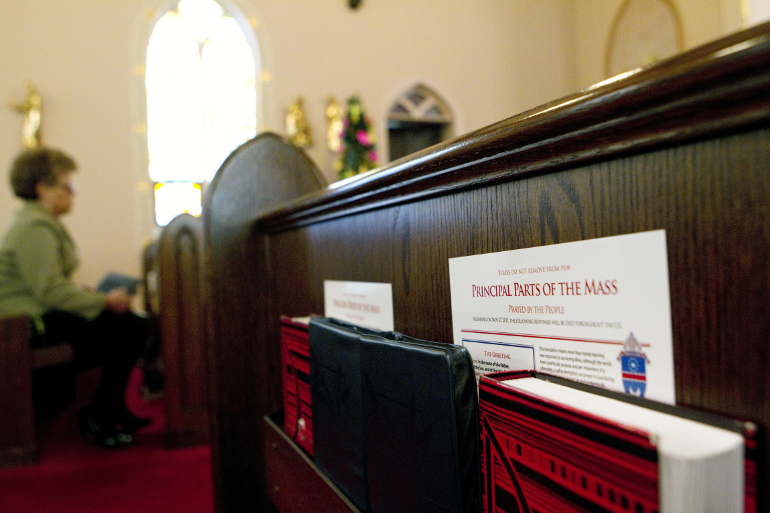
A guide to the new wording in the Mass is pictured in a pew prior to Sunday service at St. Joseph's Catholic Church in Alexandria, Va., in 2011. (CNS photo/Nancy Phelan Wiechec)
For every two U.S. priests who prefer a new set of Vatican-ordered English translations of the Roman Catholic Mass, there are three others who say they do not, according to a survey released Tuesday by Saint John’s School of Theology in Collegeville, Minn.
Fifty-nine percent of priests surveyed said they do not like the new Mass translations, which all Catholic parishes in the country were mandated to use beginning in fall 2011.
Eighty percent said they agreed with an assessment that the Latin to English translation is “awkward and distracting,” according to the St. John’s study. Sixty-one percent also said the new language needs to be revised “urgently.”
The study was conducted by the school’s Godfrey Diekmann, OSB Center for Patristics and Liturgical Studies. It invited all 178 U.S. Roman Catholic dioceses to ask their priests to respond to online questions regarding their experience with the new translations.
According to the school, 1,536 priests in 32 U.S. diocese responded. The survey took place from Feb. 21-May 6.
The translations, which were first indicated in a 2001 Vatican document, include small and large changes from previous versions of how priests say prayers and celebrate the Eucharist. They also affect ways Catholics respond throughout the ceremony.
In one of the most obvious changes, Catholics are no longer to respond “And also with you” when the priest wishes them peace, but rather “And with your spirit.”
“This survey shows fairly widespread skepticism about the new Missal by U.S. Catholic priests, with strong differences in opinion between the majority of priests who do not like the Missal and the minority who do,” the school said in a release.
Among findings highlighted by the school:
- Priests surveyed did not like the new texts by a 3-2 margin, with 59 percent saying they do not like them compared to 39% who do.
- More than 1/3 of priests surveyed said they “strongly disagree” that the new missal is an improvement over its predecessor.
- 80 percent of those surveyed said they agreed with an assessment of the new language as “awkward and distracting.”
- 61 percent of those surveyed said the new language needs to be revised “urgently,” with 43 percent strongly agreeing.
The theology school has also posted a number of responses to the survey from leaders of national and international organizations of priests.
Priests in the U.S., the head of the National Federation of Priests’ Councils told the school, have been put in an “untenable position” by the translations and have been “forced to choose between fidelity to the magisterium and feeding our people.”
“Precisely because this edition is seen as a ‘top-down’ project, many priests feel that the magisterium has not kept faith with them, so they feel no compunction to be faithful to magisterium,” said Fr. Anthony E. Cutcher, head of the group, which represents some 26,000 U.S. priests.
Mgsr. Andrew Wadsworth, the head of an international commission set up after the Second Vatican Council (1962-65) by English-speaking countries for Mass translations, noted the numbers of priests who responded to the survey represent some 3.7 percent of the nearly 42,000 in the U.S.
“Despite this, some interesting indications emerge, even if the accompanying commentary is at times selectively negative in interpreting the data,” said Wadsworth, head of the International Committee for English in the Liturgy (ICEL).
“The new translation clearly has a different voice and the survey shows that some priests do not like it. Whether they are representative of wider opinion is not ascertained by this survey.”
ICEL had prepared new English translations in 1998. While approved by the all of the English-speaking national bishops’ conferences, those translations were rejected by the Vatican’s Congregation of Divine Worship, which issued a new instruction for translations, Liturgiam authenticam, in 2001.
That text specified that translations to English from the Latin must be made “in the most exact manner, without omissions or additions in terms of their content, and without paraphrases or glosses.”
San Diego, Calif., Bishop Robert Brom, also gave a response to the Minnesota school on their survey, saying he was “not at all surprised” by its contents.
“While we don’t want to ‘throw out the baby with the bathwater,’ the new missal needs corrective surgery and this should take place without delay,” said Brom. “The views of priests must be taken into consideration.”
At a meeting of the U.S. bishops’ conference in November, Brom had said his priests describe the new missal as "more of a burden than a blessing.”
According to a posting at the popular blog PrayTell, Saint John’s also invited responses to the survey from a number of bishops and prelates who hold roles of authority in Mass translations.
Among those the blog said declined comment were Msgr. Rick Hilgartner, director of the U.S. bishops’ committee on divine worship; New Orleans’ Bishop Gregory Aymond, the current chair of the committee; and Galveston-Houston Cardinal Daniel DiNardo, its incoming chair.
Among those the blog said did not respond to comment requests were New York Cardinal Timothy Dolan, president of the bishops’ conference; and Australian Cardinal George Pell, who oversees Vox Clara, a commission set up by the Vatican in 2001 to oversee ICEL’s work on Mass translations.
A December public opinion survey of self-identified Catholics by the Center for Applied Research in the Apostolate (CARA) at Georgetown University found a seven in 10 Catholics agree with the statement, “Overall, I think the new translation of the Mass is a good thing.”
CARA surveyed 1,047 self-identified Catholic adults. The study has with a margin of error of plus or minus 3 percentage points.
[Joshua J. McElwee is an NCR staff writer. Follow him on Twitter: @joshjmac.]




